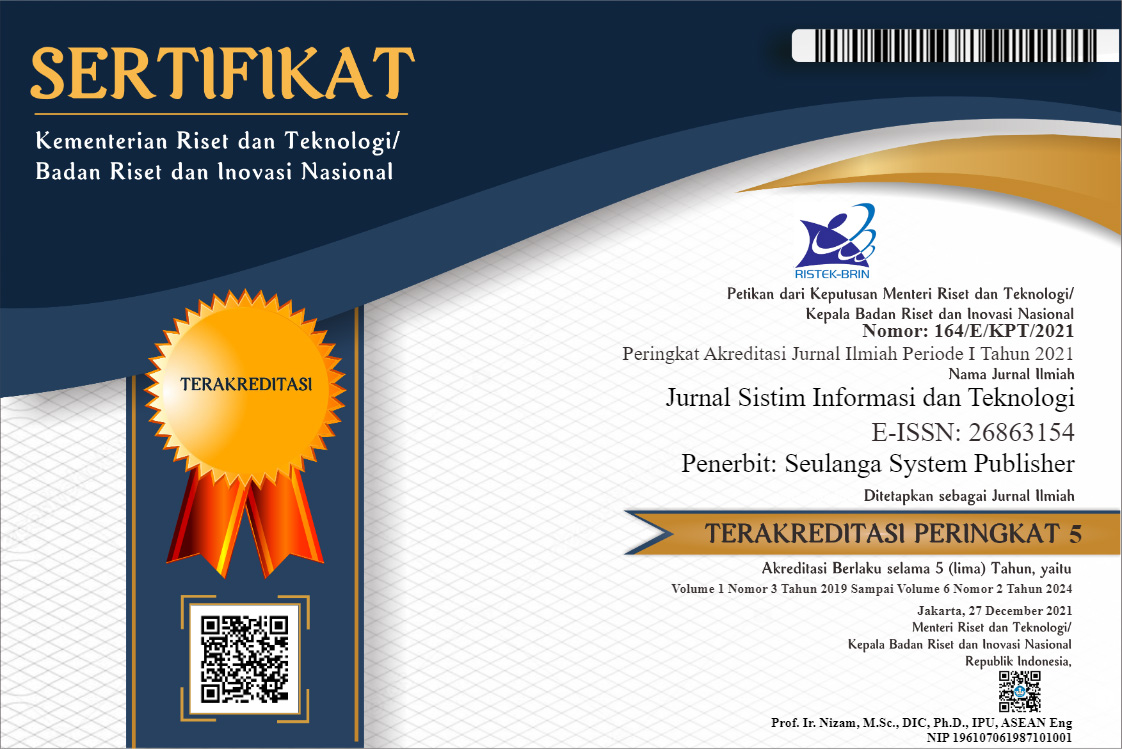Structural Model Analysis of The Relationship Between Cross-National Trade, Use of Technology and Labor Costs
DOI:
https://doi.org/10.60083/jsisfotek.v6i2.351Keywords:
Employment, Technology, Efficiency, TradeAbstract
This research aims to quantify the costs of job mobility, emphasizing the differences in costs faced by workers with different qualifications. Our analysis uses the Ordinary Least Squares and Instrumental Variables. The impact of trade and technological reforms on workers' welfare is largely dependent on the level of economic flexibility. In this context, high labor mobility costs become an important factor in analyzing the impact of trade policies. Despite workers' high mobility between job sectors, traditional theory suggests that this flexibility may not be as strong due to the greater influence of non-financial factors. This suggests that there needs to be a different policy approach to managing the impact of trade and technology reforms to ensure worker well-being and overall economic stability. Trade and technology reforms often result in increased efficiency, but they also incur certain costs. The finding that unskilled workers have higher mobility costs than semi-skilled workers is interesting, as it suggests that there are greater barriers for unskilled workers to move between employment sectors. The impact of slow adjustments in the labor market due to high mobility costs is also important, as this indicates that the economy takes a long time to adapt to changes, both from trade and technological reforms. This has long-term implications for the well-being of negatively affected workers, depending on the particular model parameters. It is important to continue to deepen our understanding of the costs of mobility and labor market adjustment, as this will help in designing better policies to support workers impacted by economic reform and change.
References
Beach, D. (2005), "From Fieldwork to Theory and Representation in Ethnography", Troman, G., Jeffrey, B. and Walford, G. (Ed.) Methodological Issues and Practices in Ethnography (Studies in Educational Ethnography, Vol. 11), Emerald Group Publishing Limited, Leeds, pp. 1-17. https://doi.org/10.1016/S1529-210X(05)11001-8
Arifin, M. S., Arijanti, S., Rahayu, B., Lubis, F. M., & Nure, H. M. (2023). Determinant Factors Of Work Stress Of Production Workers At National Printing Company. JEMSI (Jurnal Ekonomi, Manajemen, dan Akuntansi), 9(4), 1629-1634.
Nurbakti, R., Putri, L. G., Kurniawan, D. R., Judijanto, L., & Arifin, M. S. (2023). Analysis of The Influence of Digital Promotions, Perception of Ease, Transparency and Service Features Toward Public Intention to Use Digital Bank in Money Saving. Jurnal Sistim Informasi dan Teknologi, 79-84.
Maulidiyah, N. N., Arifin, M. S., & Setyawan, D. A. (2021). The Role of Discipline and Career Development in Improving Employee Work Achievement. Jambura Science of Management, 3(1), 20-25.
Arifin, M. S., Maulana, M. F., & Suroso, A. (2023). The Role of E-Customer Satisfaction as Intervening Variable in Relationship Between E-Service Quality, E-Recovery and E-Customer Loyalty of Indonesian Railroad Access Customers. Jurnal Sistim Informasi dan Teknologi, 6-10.
Davie-Kessler, J. (2016), "Ethnography as Subject, Ethnography as Object: Experimenting with Research in a College Writing Classroom", New Directions in Educational Ethnography (Studies in Educational Ethnography, Vol. 13), Emerald Group Publishing Limited, Leeds, pp. 193-212. https://doi.org/10.1108/S1529-210X20150000013007
Gardjito, M., & Swasti, Y. R. (2014). Postharvest Physiology of Fruits and Vegetables. Yogyakarta: Gajah Mada University Press.
Apriliani, R., Ashary, R., Prakoso, T., Rahmiyati, N., & Rachmawati, T. (2023). The Effect of Independent Commissioners, Corporate Social Responsibility, Investment Decisions, Institutional Ownership and Funding Decisions on Profitability. JEMSI (Jurnal Ekonomi, Manajemen, dan Akuntansi), 9(4), 1347-1353.
Prakoso, T., Apriliani, R., Durya, N. P. M. A., & Pattiasina, V. (2024). Analysis of The Influence of Information System Applications, Digital Trainings and Technology Adoption on Financial Information System Performance. Jurnal Informasi dan Teknologi, 250-254.
Apriliani, R., & Prakoso, T. (2023). The relationship between accounting practices and business performance: literature review study of SMEs in the service industry. Journal of Management Science (JMAS), 6(3), 306-314.
Hutabarat, A. S., Setyorini, U., Rustaman, D., Prakoso, T., & Utami, E. Y. (2024). Analysis of The Relationship Between Information System Management, Demand Management, Revenue and Profit Management in Logistics Industries. Jurnal Informasi dan Teknologi, 47-52.
Deng, C. (2023), "When ethnography meets scientific aspiration: a comparative exploration of ethnography in anthropology and accounting", Qualitative Research in Accounting & Management, Vol. ahead-of-print No. ahead-of-print. https://doi.org/10.1108/QRAM-11-2022-0183
Peacock, D. (2017), "Institutional Ethnography, Critical Discourse Analysis, and the Discursive Coordination of Organizational Activity", Reid, J. and Russell, L. (Ed.) Perspectives on and from Institutional Ethnography (Studies in Qualitative Methodology, Vol. 15), Emerald Publishing Limited, Leeds, pp. 91-106. https://doi.org/10.1108/S1042-319220170000015007
Downloads
Published
How to Cite
Issue
Section
License
Copyright (c) 2024 Jurnal Sistim Informasi dan Teknologi

This work is licensed under a Creative Commons Attribution 4.0 International License.









